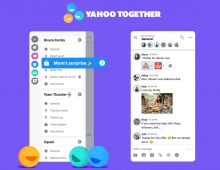
Yahoo! Buys Internet Phone Provider
Yahoo said Tuesday it had acquired DialPad Communications Inc., a 6-year-old company whose software lets people to place calls over the Internet for a fraction of the cost of regular telephone service.
The companies would not release financial details of the deal, which closed Monday.
The Internet's leading portal will use DialPad to expand its product array in the burgeoning niche of Voice over Internet Protocol, or VoIP, said company spokeswoman Joanna Stevens.
The technology converts conversations into data packets that traverse the Internet over broadband connections. Some in the industry think VoIP will eventually nudge the 130-year-old circuit-switched phone network into obsolescence.
Milpitas-based DialPad, which has about 40 employees, competes with a growing number of startups that reroute calls from computers to servers to telephones.
Current mainstream VoIP services let callers use standard phone handsets or even cell phones to make or receive calls, a big improvement on the computer-to-computer of early Internet telephony.
Depending on the subscription plan, Dialpad charges as little as 1.7 cents per minute for calls, including international calls to more than 200 countries. DialPad subscribers can also buy a prepaid VoIP calling card. The company has been offering calling plans for about two years and has more than 14 million users.
New products from Yahoo that integrate DialPad technology could debut within a few months, Stevens said.
It's unclear what Yahoo might charge for VoIP service involving calls to traditional phones.
"We still need to integrate the technology and roll out a product, and we haven't disclosed those details," Stevens said.
The acquisition is Yahoo's second VoIP announcement in less than a month. In May, Yahoo introduced a test version of its instant messaging software with an Internet telephony component that lets users make free computer-to-computer calls.
The Internet's leading portal will use DialPad to expand its product array in the burgeoning niche of Voice over Internet Protocol, or VoIP, said company spokeswoman Joanna Stevens.
The technology converts conversations into data packets that traverse the Internet over broadband connections. Some in the industry think VoIP will eventually nudge the 130-year-old circuit-switched phone network into obsolescence.
Milpitas-based DialPad, which has about 40 employees, competes with a growing number of startups that reroute calls from computers to servers to telephones.
Current mainstream VoIP services let callers use standard phone handsets or even cell phones to make or receive calls, a big improvement on the computer-to-computer of early Internet telephony.
Depending on the subscription plan, Dialpad charges as little as 1.7 cents per minute for calls, including international calls to more than 200 countries. DialPad subscribers can also buy a prepaid VoIP calling card. The company has been offering calling plans for about two years and has more than 14 million users.
New products from Yahoo that integrate DialPad technology could debut within a few months, Stevens said.
It's unclear what Yahoo might charge for VoIP service involving calls to traditional phones.
"We still need to integrate the technology and roll out a product, and we haven't disclosed those details," Stevens said.
The acquisition is Yahoo's second VoIP announcement in less than a month. In May, Yahoo introduced a test version of its instant messaging software with an Internet telephony component that lets users make free computer-to-computer calls.





















